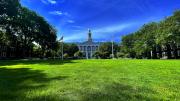Harvard Business School (HBS) announced Tuesday that, effective immediately, it would begin providing scholarships that cover the total cost of tuition and course fees ($75,990) to MBA students “with the greatest financial need”—a group that includes roughly 10 percent of the degree program’s current student body. In addition, HBS will offer need-based scholarships to a larger number of students from middle-income backgrounds by expanding eligibility; currently about half of MBA students already receive need-based support, with awards ranging from $2,500 to $76,000 per year (the average for 2021-22 was $42,000).
These changes are the most recent in a series of steps the school has taken during the past few years to make its two-year MBA program more affordable. Since 2019, HBS has held its tuition flat, and in 2020 the school revised its need-based formula to factor in socioeconomic background, along with personal income, assets, and undergraduate debt. In 2018, HBS created the Forward Fellowships, which provide $15,000 annually to lower-income MBA students who give financial support to family members while attending business school. In addition, HBS offers a need-based waiver of its $250 application fee.
MBA students who qualify for need-based scholarships for tuition and fees will still have to pay their own living expenses, which average about $32,000 per year for single students in the Boston area. Between need-based and merit-based scholarships, HBS distributes about $43 million per year in aid. It’s need-based aid is the largest of any MBA program in the world.
“Harvard Business School should be a place where the most talented future leaders can come to realize their potential,” said HBS Dean Srikant Datar in a press release announcing the aid expansion. “We know that talent is much more evenly distributed than opportunity.”









